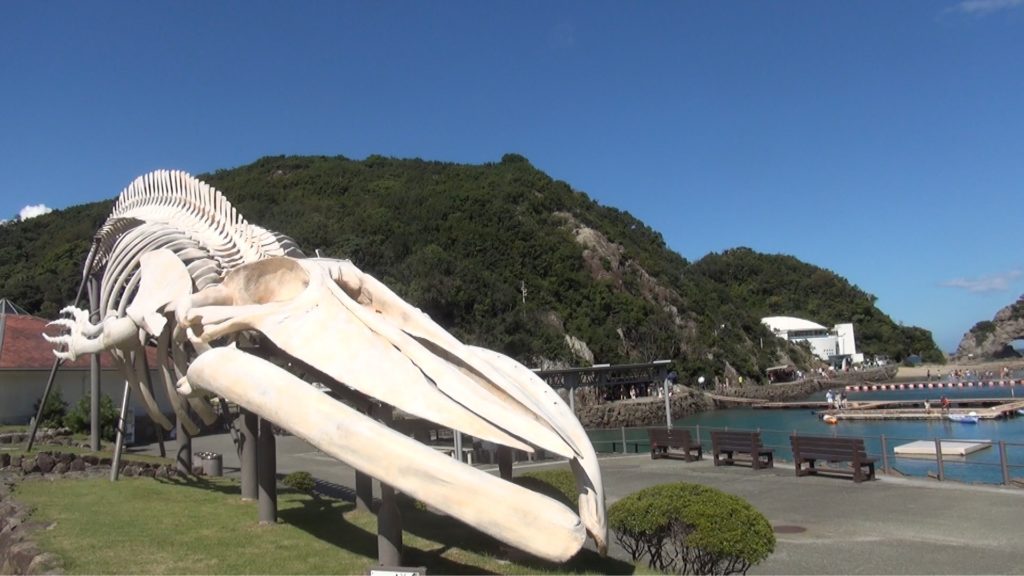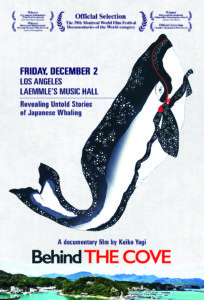
By Louis Chan
AsAmNews National Correspondent
Images of dolphins being killed in the blood soaked waters of Taiji, Japan gained widespread notoriety in the Academy Award winning film, The Cove, in 2009.
Seven years later, Japan’s answer to The Cove comes in the form of a new film, Behind the Cove, by first time filmmaker from Tokyo, Keiko Yagi.
The film made its U.S. debut in New York City this week. Its run is scheduled to end tonight, Dec 1, at the Cinema Village and then moves to Los Angeles where it plays at Laemmle Music Hall tomorrow through December 8.
Yagi’s challenge is a huge one- justifying the capture of dolphins for the amusement of animal theme park visitors and the killing of the smiling creatures by the whaling industry for its meat.
The television show Flipper may have went off the air in 1967, but its impact is carried on by Sea World and other parks where young and old alike are entertained as the beautiful smooth skinned creatures jump out of the water through hoops all while waving their tales to adoring crowds.

Yagi acknowledged the huge challenge she faced when she told AsAmNews “I can sympathize with people who think dolphins and whales are cute. I also do.”
While Yagi empathizes with the environmentalist, she is also very defiant. When asked about images of water turning red in news footage of the dolphin killings, she’s unapologetic, almost callous.
“Blood is red. We can’t change that. Unless there is new blood out there that isn’t red.”
One might better understand Yagi’s attitude when you realize the frustration that has been bottled up inside her since The Cove. She blames the Japanese people themselves for not speaking up and more loudly defending their country.
She says Behind the Cove is as much about the need for Japanese to speak up more loudly as it is about dolphins and whales.
“Many media outlets only cover the opinions of the anti-whaling camp,” she said. “Like we saw in the recent US elections, this is propaganda.
“When you consider the whole environmental issue of the earth including global warming, we need to think of the over-excess of cattle which helps pollute the oceans. We just had Thanksgiving, but food and religion have a deep relationship. If we deny food culture, we deny religion. I believe the first war was started by a difference in religion. So, unless we respect each other’s food culture, we will never stop fighting.”
Among those she interviews in Behind the Cove is one of the main characters from The Cove, Richard O’Barry.
“It’s a very small minority of men in Taiiji who are doing this,” O’Barry tells Yagi. “We shouldn’t blame all the people in Taiiji and all the 127 million people in Japan.”
Yagi’s film suggest Japan is the scapegoat and diverts attention from the United State’s own animal cruelty issues in its food and fishing industry.
 “I used to be a secretary at Paramount Pictures Japan,” she said. “I traveled the world including places like Galapagos, Cuba, the Amazon, Israel, Kenya. exotic places. This allowed me to take a new look on Japan from the outside. It frustrated me that Japanese people did not voice their opinion.”
“I used to be a secretary at Paramount Pictures Japan,” she said. “I traveled the world including places like Galapagos, Cuba, the Amazon, Israel, Kenya. exotic places. This allowed me to take a new look on Japan from the outside. It frustrated me that Japanese people did not voice their opinion.”
Yagi will be in Los Angeles for a question and answer session after three screenings:
• Fri. 12/2 at 7:20pm
• Sat. 12/3 at 7:20pm
• Sun. 12/4 at 2:20pm
Behind the Cove runs 105 minutes with English and Japanese subtitles.
AsAmNews is an all-volunteer effort of dedicated staff and interns. You can show your support by liking our Facebook page at www.facebook.com/asamnews, following us on Twitter, sharing our stories, interning or joining our staff.


RE: New film defends killing of dolphins in Japan:Stop buying Japanese products. It would take a single telephone call from the CEO of Sony, or Toyota, or Nissan etc to the Japans PM to stop this barbaric practice, a practice that greatly (and rightly) besmirches Japans otherwise excellent reputation for being a highly civilised country consisting of intelligent and sensitive people.
RE: New film defends killing of dolphins in Japan: Why not stop buying European products? Is it cause they're white? Norway has a whaling problem. Sweden overfishes. France stuffs horsemeat into certain types of steaks and porks. Also doesn't the Fur coat industry get its start there?